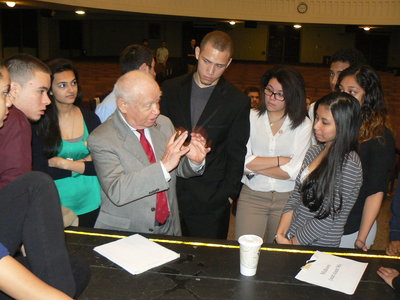For Sami Steigmann, speaking to 700 grammar school students about the Holocaust and his experiences during it is not just about teaching history. It is also about his hope to never let history repeat itself.
“Anti-Semitism is on the rise, and it used to be confined to countries,” he said. “But the internet is a double-edged sword; there is a lot of information, but at the same time, you can spread hate. Be careful what you put on Facebook and social media, because that will be part of your legacy.”
Steigmann, 74, was the guest speaker at The History of Genocide and The Holocaust program held at Bayonne High School on May 15. Gene W. Woods, a teacher of U.S. History II and “Facing History and Ourselves: The Holocaust and Human Behavior,” presents the program each year for the district.
He asked Steigmann to speak this year because of his unique perspective. Steigmann was a young child when placed in a labor camp in Mogilev, Ukraine, with his parents. He was incarcerated from about age one and half years old until he was four, when he was liberated.
Steigmann revealed just how horrific his experience was. Years later he discovered that he had been the victim of experiments while at the camp. Luckily, he doesn’t remember much about that period of his life.
“It’s a blessing in disguise,” he said. “I probably knew it at one time, but my memory’s not what it used to be.”
Steigmann advised that to avoid another Holocaust, there are two things people must learn to do.
“Learn not to hate,” he said. “It is the most difficult job you’ll ever have to do.”
The second thing is equally difficult, according to Steigmann.
“You have to be able to forgive,” he said. “I’ve lived to forgive the world which stood by and did nothing.”
Before and after his discussion, students asked questions. Woods’s high school students attended to assist and help educate the grammar school students.
“The Holocaust isn’t taught in the scope that it should be,” said Alyssa Baez, 17, a junior. “We all know it’s important. We’re really on our ‘A’ game for this entire program. It’s really important to teach the kids.”
Jesse Wollen, 16, a junior in the Advanced Placement U.S. History honors program, agreed.“I think it’s important,” he said. “In some countries it’s not even taught. And in the U.S., it’s taught less.”
Avery Kelly, 18, feels that learning about the infamous period in world history can help students learn how to stand up for what is right, instead of agreeing with a group doing wrong.
“Obviously this was done out of hatred,” she said. “But maybe they didn’t feel safe. This is learning about why people follow the crowd, instead of leading.”
Youngest understand
The grammar school students seemed to understand the enormity of the Holocaust, and why it was important for them to learn about it.
“I think they didn’t deserve to die,” said Arman Moazampour, 12, a student at Nicholas Oresko School, of the millions of Holocaust victims. “I’d have liked to speak up to the world and tell them it’s not right; why should they have had to suffer?”
“We have freedom, but they didn’t have that,” said Asma Noubani, 13, also of Oresko School. “I leave today with a greater understanding and will grow as a person.”
Additional education
Two local Holocaust survivors were in the audience to share their stories with the students. Following the program on May 15, Woods took his students to the Museum of Jewish Heritage: A Living Memorial to The Holocaust in New York City.
Joseph Passantino may be reached at: JoePass@hudsonreporter.com.
